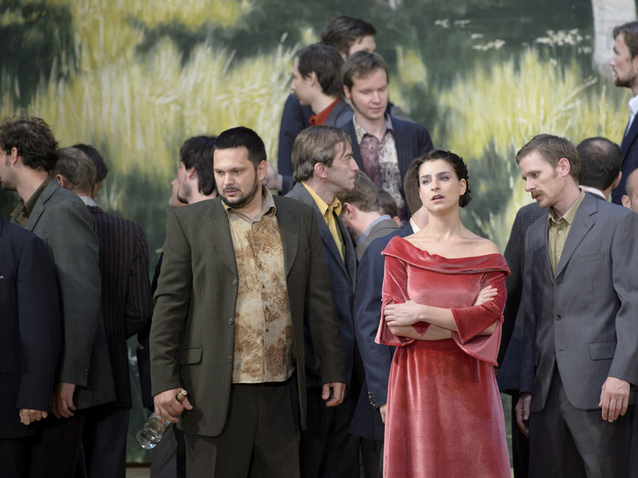 © Theater an der Wien
© Theater an der Wien
This is one of Tchaikovsky's seldom played operas, although the composer praised it as one of his best. An initial rather poor acceptance by the audience and a demanding performing effort with 14 soloists and big choir has left this oeuvre off the programme of the opera houses. So it is a real honorable move of the small but high quality Vienese opera house, the Theater an der Wien, to contribute to the revival of this elegant romantic opera, showing well the development of Tchaikovsky's composing style at the end of his lifetime. We can feel the influence of Rachmaninoff's soft , wide and full orchestral sound, Wagnerish through composed without arias and polychromatic harmony. It is the first presentation in Austria at all and has been realised with the support of the Mariinsky Theater. The plot is the tragic story of the encounter of a young mysterious girl with an aristrocratic family. Father and son fall in love, the duchess seeking for revenge and killing the girl. The young prince, her beloved son, is killed by the jealous father by accident. The cast is mainly Russian coloring the singing in the typical heavy, voluminous dark timbre. Together with the big orchestra playing with full emotion the small theater is overloaded with sound and volume. Young good looking Lithuanian Asmik Greogrian is Nastasja or the so called Kuma, running a variete like cafe, celebrating an open athmosphere comforting young people. Her enemies call her the enchanteress. Fragile and fine her statue, evenmore impressive her strong voice with a dark metall height. Russian tenor Maxim Aksenov has already gained a Europeanwide recognition and once more shows his powerful voice, remaining safe and clear in the height, flexible and fine modulating. His presentation of love to his mother, his confession of feelings to Nastasja remind us of traditional Russian melancholy and desire.Vladislav Sulimsky and Agnes Zwierko are his father and mother, a couple being blocked by their emotions and claim for power. Both desperate and threatened by being rejected by the beloved demonstrate in their singing warm admiration as well as disgust. Their voices swap a liitle bit dry and clumsy, showing too much effort. The Arnold Schönberg Choir present again his outstanding class and quality. Omnipresent, perfectly prepared and skilful in the use of the Russian language they contribute a lot to the success of the evening. The young Russian Mikhail Tatarnikov, Musical head of the Mikhailovsky theatre, pushes the ORF Radio Symphonieorchester vividly. It is in full size and seems to overflow the pit, at least its sound does. Taming them seems hard but it is no competition with the stage, it is a joint message of Tchaikovskys ability of drama and musical underlining.
Christof Loy and his stage designer Christian Schmidt create a neutral setting with minimalistic decoration. Big images of natural environment like the view on Nishni Novgorod or into the dense forest projected on stage dominate. We have a lot of action in the first act, bringing the cafe into a life cabaret, second act gives an insight into the feelings and conflicts of the aristrocratic family, developing further in the intimate third act culminating in the tragic end. A splendid performance and a pleasant encounter with this elaborated and fine masterpiece. The audience is moved by the story and expressive music and spends a hearty applause to merit the artistic presentation of all.
Picture © Monika Rittershaus
the 25 of September, 2014 | Print
Comments